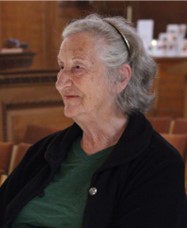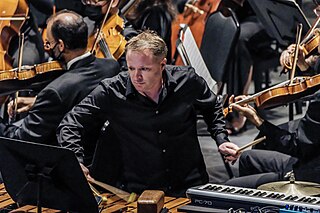Related Research Articles

A percussion instrument is a musical instrument that is sounded by being struck or scraped by a beater including attached or enclosed beaters or rattles struck, scraped or rubbed by hand or struck against another similar instrument. Excluding zoomusicological instruments and the human voice, the percussion family is believed to include the oldest musical instruments. In spite of being a very common term to designate instruments, and to relate them to their players, the percussionists, percussion is not a systematic classificatory category of instruments, as described by the scientific field of organology. It is shown below that percussion instruments may belong to the organological classes of ideophone, membranophone, aerophone and cordophone.

Dame Evelyn Elizabeth Ann Glennie, is a Scottish percussionist. She was selected as one of the two laureates for the Polar Music Prize of 2015.

Thea Musgrave CBE is a Scottish composer of opera and classical music. She has lived in the United States since 1972.
Sarah Frances Beamish is a British composer and violist. Her works include chamber, vocal, choral and orchestral music. She has also worked in the field of music, theatre, film and television, as well as composing for children and for her local community.
Veni, Veni, Emmanuel is a concerto for percussion and orchestra by James MacMillan. MacMillan began composing it on the first Sunday of Advent 1991 and completed it on Easter Sunday 1992, dates that are significant to the work itself. The work was commissioned by Christian Salvesen PLC. It received its premiere on 10 August 1992 at the Royal Albert Hall, London, performed by Evelyn Glennie and the Scottish Chamber Orchestra under Jukka-Pekka Saraste. The work is in one movement, and lasts around 25 minutes. The music draws on the Advent plainchant of the same name, which appears in its full form only at the end.
The Sacrifice is an opera in three acts composed by James MacMillan with a libretto by the poet Michael Symmons Roberts based on the Branwen story of the Welsh mythology collection, the Mabinogion. The world premiere took place on 22 September 2007 at the Donald Gordon Theatre of the Wales Millennium Centre, Cardiff. The production was staged by Welsh National Opera, directed by Katie Mitchell and conducted by the composer.
Alexander Mikhailovich Raskatov is a Russian composer.

Colin David Currie is a multi award-winning Scottish virtuoso percussionist. He is the founder and leader of the Colin Currie Group, an ensemble specializing in performing and recording the music of Steve Reich.
The Percussion Concerto is a one-movement concerto for solo percussion and orchestra by the American composer Jennifer Higdon. The work was jointly commissioned by the Philadelphia Orchestra, the Indianapolis Symphony Orchestra, and the Dallas Symphony Orchestra, with contributions from the Philadelphia Music Project and the Lacy Foundation of LDI, Ltd. The piece was completed in 2005 and is dedicated to the percussionist Colin Currie, for whom the concerto was written. The piece won the 2010 Grammy Award for Best Classical Contemporary Composition. That same year, Higdon won the Pulitzer Prize for Music for her Violin Concerto (2008).
Incantations for Percussion and Orchestra is a concerto for percussion and orchestra in three movements by the Finnish composer Einojuhani Rautavaara. The work was composed for the percussionist Colin Currie on a joint commission from the London Philharmonic Orchestra, the Baltimore Symphony Orchestra, the Rotterdam Philharmonic Orchestra, and the Tampere Philharmonic Orchestra. The first performance was given in Royal Festival Hall, London by Currie and the London Philharmonic Orchestra under the conductor Yannick Nézet-Séguin on October 24, 2009.
The Percussion Concerto No. 2 is a concerto for solo percussion and orchestra by the Scottish composer James MacMillan. The work was jointly commissioned by the Netherlands Radio Philharmonic, the Philharmonia Orchestra, the Orchestre national du Capitole de Toulouse, the Cabrillo Festival of Contemporary Music, the Baltimore Symphony Orchestra, and the São Paulo State Symphony. It was first performed on November 7, 2014 at TivoliVredenburg in Utrecht, the Netherlands, by percussionist Colin Currie and the Netherlands Radio Philharmonic under conductor James Gaffigan. The composition is MacMillan's second percussion concerto after 1992's Veni, Veni, Emmanuel.
The Cello Concerto is a composition for solo cello and orchestra by the Scottish composer James MacMillan. It is the second of three interrelated compositions in MacMillan's Easter triptych Triduum commissioned by the London Symphony Orchestra. The piece was first performed at the Barbican Centre on October 3, 1996 by the cellist Mstislav Rostropovich and the London Symphony Orchestra under the conductor Colin Davis. The work is dedicated to Mstislav Rostropovich.
Conjurer: Concerto for Percussionist and String Orchestra is a concerto for a solo percussionist and string orchestra by the American composer John Corigliano. The work was jointly commissioned for the percussionist Evelyn Glennie by the Pittsburgh Symphony Orchestra, the Nashville Symphony, the Royal Scottish National Orchestra, the Dallas Symphony Orchestra, the Calouste Gulbenkian Foundation, the Music Department (Lisbon), and the National Arts Centre Orchestra. It was given its world premiere by Glennie and the Pittsburgh Symphony Orchestra under the direction of Marin Alsop in Pittsburgh on February 21, 2008.
Two Controversies and a Conversation is a composition for piano, percussion, and chamber orchestra by the American composer Elliott Carter. Its world premiere was given on June 8, 2012 at the Metropolitan Museum of Art in New York City by the pianist Eric Huebner and the percussionist Colin Currie with the New York Philharmonic under the direction of David Robertson. The piece is dedicated to Colin Currie and the pianist Pierre-Laurent Aimard. It was one of the last works composed by Carter, who completed the piece at the age of 103.
A percussion concerto is a type of musical composition for a percussion soloist and a large ensemble, such as a concert band or orchestra. Two notable figures in the genre are the percussionists Colin Currie and Evelyn Glennie, who have separately commissioned and premiered numerous entrees to the repertoire. Two common subsets of the percussion concerto are the timpani concerto and the marimba concerto.
The Aluphone is a tuned percussion instrument consisting of aluminum bells that are struck with a mallet to produce musical tones. In its standard configuration, the bells of the Aluphone are mounted on a frame, but it can also be played as a single handheld bell or as a stack of bells. The bells of the Aluphone are very durable, so they can be struck with a large variety of mallets, wands, or hammers depending on the tone that the musician seeks to produce.
The Percussion Concerto is a composition for solo percussion and orchestra by the Scottish composer Helen Grime. The work was commissioned by the Southbank Centre, the Baltimore Symphony Orchestra, and the Swedish Chamber Orchestra. It was first performed by the percussionist Colin Currie and the London Philharmonic Orchestra conducted by Marin Alsop at the Royal Festival Hall, London, on 16 January 2019.

Marjory Dougal was a highly respected and influential administrator and vice-president of the Edinburgh Youth Orchestra for thirty years.
The Symphony No. 5 or Concerto for Orchestra is a composition for orchestra by the American composer Ellen Taaffe Zwilich. The work was commissioned by the Juilliard School in honor of Bruce Kovner and Suzie Kovner with support of the Trust of Francis Goelet. It was first performed by the Juilliard Orchestra conducted by James Conlon at Carnegie Hall on October 27, 2008.
References
- 1 2 3 Musgrave, Thea (2004). "Wood, Metal and Skin". G. Schirmer Inc. Retrieved 16 July 2023.
- ↑ Walker, Lynne (10 January 2005). "National Youth, Orchestra of Scotland, Usher Hall, Edinburgh". The Independent . Retrieved 16 July 2023.